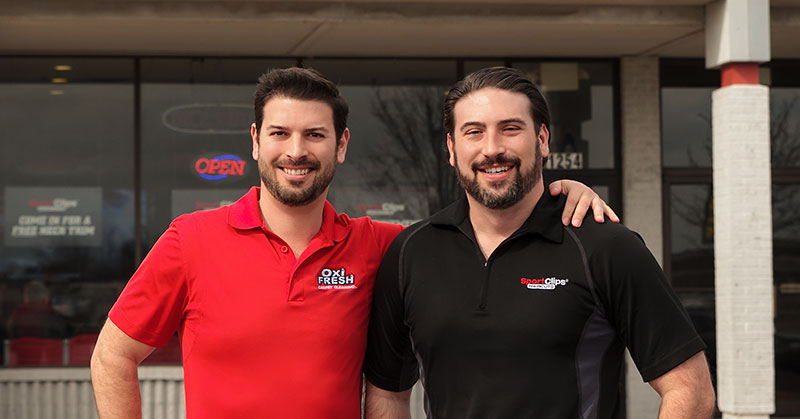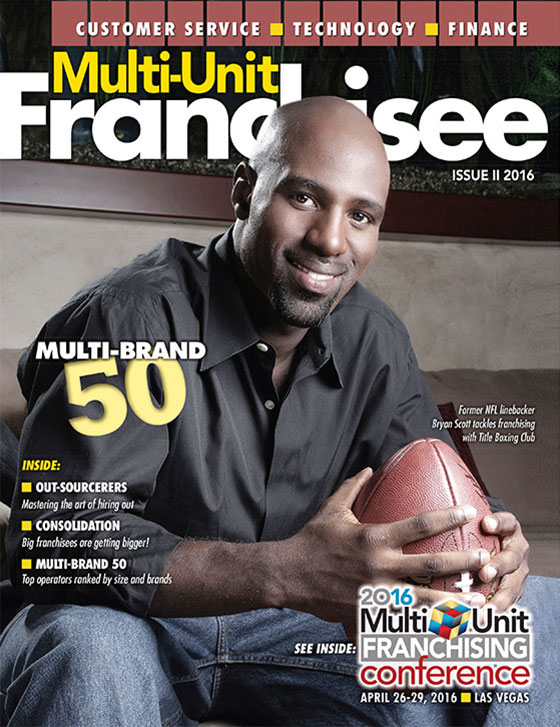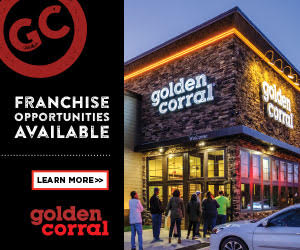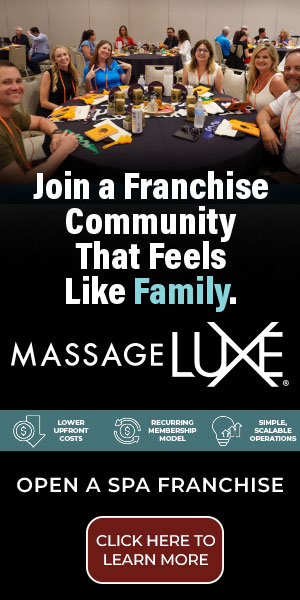Sibling Harmony: Leveraging Their Differences to Build a Company

In some ways, brothers Jesse and Charles Keyser, 39 and 35, are very different, and that's good. So are their three brands--Little Caesars, Sport Clips, and Oxi Fresh Carpet Cleaning--which also is good. They've built their business over the past decade, by leveraging Jesse's salesmanship and drive, Charles' operational skills and passion for food, and their combined social media savvy into a steadily expanding franchise company.
"Charles is my counterbalance," says Jesse. "He's a more conservative person. He makes sure I can go out and open doors at a quick pace without us getting into financial trouble. Before we sign a lease, we talk about it. If we both feel good, we do it. If one doesn't, we put it on hold."
Their division of duties has Charles in charge of operations for Little Caesars (their first franchise) and Oxi Fresh, which the brothers signed on with in 2014 after being impressed by the brand at the Multi-Unit Franchising Conference. Jesse, a single father of two, handles operations for Sport Clips, their largest franchise with 14 units and more in the pipeline.
The competitive atmosphere between the brothers when they were growing up in a small town in Illinois has been laid to rest. "We both have different skill sets and we both enjoy success," says Charles. "Knowing that our success depends on each other has created a mutual respect. We're not the same person and don't attack situations in the same way, so we have more opportunities to solve problems."
By the time Jesse graduated from Southern Illinois University in Carbondale, he'd begun working for some friends who had started a successful dot.com company. "I was making a lot more money working in technology and that was important to me, so I left grad school after six weeks," he recalled. "I told Charles to go ahead and graduate, and that I'd spend those years saving money so we could go into business together. Since he was interested in food and the restaurant business, I suggested that he go for a degree in restaurant/hotel management. When he graduated from Southern Illinois, we bought our first Little Caesars. After a year, I quit my job to help Charles open our second store."
The Keysers came to franchising after some good advice they received while looking at restaurants. "Our original idea was to buy out the existing pizzeria we'd eaten at in college," says Jesse. "It was a great product and we liked the location, but it had been mismanaged and was in a death spiral. As we were planning to talk to the owner about buying it, one of my bosses at the tech company said, 'Your first business needs to be franchised. It's an already established system and it will teach you to run a business.' That made perfect sense to us."
The brothers began to look at pizza franchises, and since they were still young enough to think Carbondale was the "center of the universe," as they put it, they asked about locations there. After some initial stumbles, they found Little Caesars online. "We didn't know much about them because there were none in our area. They'd just started doing the $5 pizza deal, which was so brand new it wasn't even on the national website yet. We thought that was such a hot concept that we opened our first restaurant in 2005," Jesse says.
Within 3½ years they opened four Little Caesars in Southern Illinois and Western Kentucky. "That was a great choice," Charles says. "Even though 2008 and 2009 were rough, we still excelled. Little Caesars has created such a niche for itself, serving everyone from a single person to a large family--and they're committed to value. For the last 7 or 8 years, they've been voted the best value in America in QSR surveys."
After they opened their fourth Little Caesars, Jesse's wife at the time wanted to move from the medical field to being a Valpak franchisee. Jesse worked with her, doing cold calls on hair salon owners and trying to discuss their advertising options. "Every owner I called was extremely rude," he says. "I thought that if they're this rude to the public in general, they're probably not meeting the needs of their customers."
The brothers' response was to sign a contract in 2010 with Sport Clips to open 26 units in 5 states (Illinois, Missouri, Kentucky, Michigan, and Indiana). They're now more than halfway to that goal and are in the process of relocating to the St. Louis area to make that rapid growth more manageable.
"Hair salons are in a completely different market from Little Caesars," says Jesse. "Sport Clips is not the lowest-priced product, but you have a more personalized, one-customer/one-employee relationship."
The Keysers were attracted to their third brand, Oxi Fresh, because of the "brand recognition with the word Oxi," the very specific answers they received to their questions from the franchisor, and the company's technological savvy. "What they're doing on the back end from the tech perspective is light years ahead," says Jesse. In September 2014, the brothers bought out the St. Louis market, which dovetailed nicely with what they were already planning for their other two brands.
Asked why they chose three such diverse brands, the brothers say the answer is simple. "Charles and I learned early on with our first restaurant location that the fundamentals people taught us about how a real business runs and looks could apply to any type of industry," says Jesse. "It's like plug-and-play for us at this point. We offer amazing customer service and added value to what we're charging." One key to their success has been the philosophy that they can't be at all locations all the time, he adds. "That's why we find inspired people to live out our mission when we're not around."
They also credit their multi-unit, multi-brand success to their use of social media. "When we talk about social media, Twitter and Facebook, this is where we see advertising moving to," says Jesse. "Two hundred years ago, each community had a butcher, a baker, and a candlestick maker, and every business was based on location and word of mouth. If you weren't the better of the two butchers, you wouldn't get much business.
"Then came mass broadcast and national brand creation. You could tell only two or three people about your product and still out-advertise any negative word of mouth. Now, because of Twitter, Yelp, Facebook, and the review sites, we're going back to where customers are trusting reviews from other users more than fancy ads on TV. This is the next level of marketing online: controlling your reputation by giving good service and encouraging fans to tell others about your business."
The ambitious brothers, who have dreams to build a second home in their beloved New Orleans, counsel would-be multi-brand franchisees to start at the beginning. "Our advice is to open several locations of the first brand and get comfortable with remote management before worrying about taking on a second brand. It's easier to have two locations with the same brand than one location of one brand and one of another," says Jesse.
"The other secret, which Charles handles for us, is to make sure your financials are very clean and understandable to other people. You need to know where you stand, and you don't want to get your financials thrown back at you."
Names: Jesse and Charles Keyser
Title: Co-owners
Company: Keyser Enterprises
No. of units: 14 Sport Clips; 5 Little Caesars; 5 Oxi Fresh Carpet Cleaning vans
Age: Jesse 39, Charles 35
Family: Jesse has two children, Katja and Gunnar; both are single
Years in franchising: 11
Years in current position: 11
Personal
First job:
De-tasseling corn in Hoopeston, Ill., when we were kids.
Formative influences/events:
Jesse: Having a franchise rep sit us down, be frank, and tell us we were not running our business in a way that would make them feel comfortable granting us a second location. We were young and could throw out tons of excuses, but they were all shut down with, "It doesn't matter." Because of that one meeting, we looked at the way a company should be run completely differently. It gave us the discipline and motivation to open units faster than our peers.
Key accomplishments:
Owner of the Year for Sport Clips, New Franchisee of the Year for Oxi Fresh Carpet Cleaning.
Biggest current challenge:
Jesse: Deciding which market to go into next, or what concept to look at next. Just because you have the ability to chase after a good deal doesn't mean it's a great deal for you in the long run.
Charles: Both Little Caesars and Sport Clips are brick-and-mortar concepts, while Oxi Fresh is not, so my biggest challenge right now is learning the best way to operate Oxi Fresh.
Next big goal: After building out our existing brands, we want to create a new business that is multi-location and designed to be franchise-feasible, whether it's franchised or not.
First turning point in your career:
Being able to pay ourselves after the second location opened up.
Best business decision:
Hiring and developing area managers before they are really needed.
Hardest lesson learned:
Jesse: Think before you speak. I have said a lot of things to a lot of people that at first I thought was the best advice possible, only to have it blow up in my face because I didn't take the time to understand everyone I was dealing with wasn't exactly like me.
Charles: Trust but verify.
Work week:
Jesse: I take one full week out of every four weeks to travel to each region we have locations. We have meetings with anyone and everyone that has a key to one of our locations (any level of management). We spend half the time talking about the last four weeks' numbers, and the other half in leadership development as well as goals for the next four weeks. Other than that, I can be found in my office, Starbucks, or on my sofa at home with my laptop doing research on best practices on recruitment, marketing, and organizational development.
Charles: I work five or six days a week.
Exercise/workout:
Jesse: Monday through Friday at 5:20 a.m., mostly weight training and long-distance running.
Charles: I take an hour out of work in the afternoon to work out.
Best advice you ever got:
Jesse: "Don't spend any time looking for Mrs. Right; spend all your time being Mr. Right--she will find you." (Joe Sickles, Theta Xi fraternity).
Charles: Make the pain of doing it wrong greater than the pain of doing it right.
What's your passion in business?
Jesse: Developing people and building new locations.
Charles: Creating an atmosphere that empowers our people.
How do you balance life and work?
Jesse: Each quarter I choose days in the week when I purposely stay out of the office. My goal is to add more days out of the office each quarter as I get more efficient at running my business.
Charles: I schedule free days for personal business. On those days, I don't check emails and I set my phone to ring only from key people in my company in case of an emergency.
Guilty pleasure:
Both: Long weekends in New Orleans!
Favorite book:
Jesse: Outwitting the Devil by Napoleon Hill.
Charles: It's Your Ship by D. Michael Abrashoff.
Favorite movie:
Jesse: "Tombstone";
Charles: "The Thomas Crown Affair."
What do most people not know about you?
Jesse: I was a college cheerleader.
Charles: I love to cook! Cooking is a huge release for me. Normally I focus on one cuisine at a time until I have learned a lot about it and its history. Right now I'm finding Spanish cuisine amazing.
Pet peeve:
Jesse: People who do not show up on time. If you can't show up on time, you can't be counted on.
Charles: When leaders blame others.
What did you want to be when you grew up?
Jesse: An attorney. But once in college I had fraternity brothers pull me aside and say, "You can talk, you should do sales and make way more than an attorney."
Charles: A professional mountain climber.
Last vacation:
Bahamas last year on a trip from Sport Clips for being Owner of the Year.
Person I'd most like to have lunch with:
Jesse: John Paul DeJoria (billionaire entrepreneur, Paul Mitchell co-founder).
Charles: Sylvester Stallone.
Management
Business philosophy:
"Up-N-Out" is the philosophy we have developed where we are constantly developing people to move up in our organization--or out of our organization to pursue great opportunities with another organization. They never leave to work for a competitor because the skills we teach them are so applicable that the opportunities with us are huge for them. If you think of how an organization is structured, almost always like a pyramid, everyone at one level can't move up to the next level--there isn't room for everyone. So we have the culture that if you give us your best while you are with us, we will invest in you the same as someone who professes to be a lifer. Does this cause us to spend time and money on people whom we may not get the best return on investment from? Possibly, but when you get a phone call a year after someone leaves your organization to pursue a great opportunity and they call to personally thank you for teaching them things they wish their parents did, it is by far the greatest accomplishment we could think of--not to mention that while they are with us they kill it with customer experience and leadership!
Management method or style:
Create systems that make the majority of the work force look like they are top performers when initially they joined our team as average players. Then develop those people to realize their full potential and truly become top performers.
Greatest challenge:
Staying ahead of the curve in leadership development. We constantly are reading and meeting with people we can learn from on the subject. As you feed your team members with more knowledge and skills, their appetite grows and the questions they ask become more complex and deeper. We have to constantly sharpen our ability to broadcast a vision that inspires and drives people to grow and thrive.
How do others describe you?
Jesse: Driven, well-read, with lots of bravado.
Charles: I had to ask some others this question. They said I am a great listener who holds others accountable but still makes them feel like I have their back.
One thing I'm looking to do better:
On-boarding all our team members better. The first 15 percent of the process determines 85 percent of the overall success.
How I give my team room to innovate and experiment:
We are rigid with following systems, but we have regular meetings that are frank where we simply ask "What is working and what isn't?" If a good idea comes up, we talk about it and make the decision to pilot it before we roll it out company-wide. If it's successful, we roll it out company-wide, giving credit to the team member who came up with the idea, how it has evolved, and how it has been tested and proven.
How close are you to operations?
Jesse: I am actually proud to say that we don't do site visits very often. I do have face-to-face meetings with every team member who has a key to any of our locations every four weeks. I rely on area managers to make frequent site visits and manage day-to-day operations. I focus exclusively on leadership development and grand openings.
What are the two most important things you rely on from your franchisor?
A strong marketing plan and support, and R&D of new products and vendors.
What I need from vendors:
Streamlined processes to order and support.
Have you changed your marketing strategy in response to the economy? How?
Jesse: Yes. We focus so much on Internet marketing now. Print, while not dead, isn't getting the same ROI as it once did.
Charles: Great operations is also key to our success.
How is social media affecting your business?
It's allowing us to have direct contact with more of our customers. We have learned that when it's handled correctly, we have the power to turn issues into opportunities.
How do you hire and fire?
We fire very few people. Most who leave us do so because they are not a good fit, and it's painfully clear to everyone. When we hire, we are looking for people who like to be challenged and want to grow.
How do you train and retain?
When training, we teach "reasons, not rules." We found that when a new team member understands the "why" behind a policy first, the rule becomes easy to manage.
How do you deal with problem employees
? We're quick to address issues.
Fastest way into my doghouse:
Treat a fellow team member or customer poorly.
Bottom Line
Annual revenue:
$10 million.
2016 goals:
Open more Sport Clips locations while growing same-store sales in mature stores, and doubling the number of vans for Oxi Fresh.
Growth meter: How do you measure your growth?
Same-store sales up over the same quarter last year.
Vision meter: Where do you want to be in 5 years? 10 years?
In 5 years, we want to continue to grow the three concepts we own in same-store sales and total number of locations. We'd like to have a second home in New Orleans, and start a fourth concept to keep us fresh and in the "still learning" mindset. In 10 years, we want to have over 100 units of all our concepts combined. At that point, we'll be self-financing most of our growth. At the 10-year mark, we will have already developed people to run each of our concepts, and we'll move to the "investor" category mentioned in the book Rich Dad's Cash Flow Quadrant by Robert Kiyosaki.
How is the economy in your regions affecting you, your employees, your customers?
We aren't experiencing any issues with the economy. We do think that the customer base has become more frugal in how they spend discretionary income. They are demanding a bigger bang for their dollar. Everything we do as an organization, from the time the customer walks into one of our locations to the time they leave, is about building value in everything we do. You can only do that if you train your team to do that consistently.
Are you experiencing economic growth in your market?
All of our locations are up over last year and have trended like that for several years.
How do changes in the economy affect the way you do business?
Jesse: They don't. We started out in rural markets where you didn't see big swings up or down in the economy. With little to no population growth in these markets, we have had higher-than-average PSAs (per store averages) for our brands because we simply focus on executing as close to perfect as we can, and always take the hard look in the mirror on what could we do better. When we move into markets where the population density is greater, it feels like it's so much easier for us. I equate it to living and training in high elevations where the oxygen is thin, and then coming down to sea level to compete with everyone who lives and trains at sea level.
How do you forecast for your business?
We determine what we want to be up for the year as a percentage of net sales. Then we walk it backwards to determine what we estimate the average tickets will be and how many team members we need to serve that number of clients. It boils down to hiring and training the right people to handle the increase in business. We have never been afraid to spend money on marketing to drive in new customers when we feel the operations inside the four walls are as good as can possibly be.
What are the best sources for capital expansion?
Local banks have been great to us. We are at the tipping point where many of our upcoming projects can be self-funded.
Experience with private equity, local banks, national banks, other institutions? Why/why not?
We have always used local banks. We like the relationships and the fast decisions we can get back.
What are you doing to take care of your employees?
A large percentage of our team members start with us at entry-level positions. We are not fans of them always being at that level, but the only way they can advance is if they are trained and developed beyond what their current responsibilities require of them. We try to do that for them so they can advance.
How are you handling rising employee costs (payroll, minimum wage, healthcare, etc.)?
We have always been a big fan of over-developing our team members. We do have some turnover as we help develop them beyond the position they are in, and they leave to advance their personal careers if we don't have room to promote them at that moment. But it also makes those team members and the ones who stay with us long term way more productive than their counterparts in competing companies. We feel we can keep labor costs down by increasing productivity and the average ticket.
How do you reward/recognize top-performing employees?
We have all of management compensated by performance. Every week "Top 10's" and other awards are given to locations and individual team members.
What kind of exit strategy do you have in place?
Jesse: I have young children and Charles and I are both single. I don't have any definite plans on my kids working directly in the business and taking it over one day, but they are being raised to be stewards of the corporation where they will be able to train and hire people to run the day-to-day operations, while following wherever their own passions may lead them--in or outside of the company.
Share this Feature
Recommended Reading:
FRANCHISE TOPICS
- Multi-Unit Franchising
- Get Started in Franchising
- Franchise Growth
- Franchise Operations
- Open New Units
- Franchise Leadership
- Franchise Marketing
- Technology
- Franchise Law
- Franchise Awards
- Franchise Rankings
- Franchise Trends
- Franchise Development
- Featured Franchise Stories
FEATURED IN

Multi-Unit Franchisee Magazine: Issue 2, 2016

$500,000
$65,000





 The multi-unit franchise opportunities listed above are not related to or endorsed by Multi-Unit Franchisee or Franchise Update Media Group. We are not engaged in, supporting, or endorsing any specific franchise, business opportunity, company or individual. No statement in this site is to be construed as a recommendation. We encourage prospective franchise buyers to perform extensive due diligence when considering a franchise opportunity.
The multi-unit franchise opportunities listed above are not related to or endorsed by Multi-Unit Franchisee or Franchise Update Media Group. We are not engaged in, supporting, or endorsing any specific franchise, business opportunity, company or individual. No statement in this site is to be construed as a recommendation. We encourage prospective franchise buyers to perform extensive due diligence when considering a franchise opportunity.